POISONED WATERS
‘It’s ugly, it’s completely sickening,’ says water expert on Joburg’s rivers
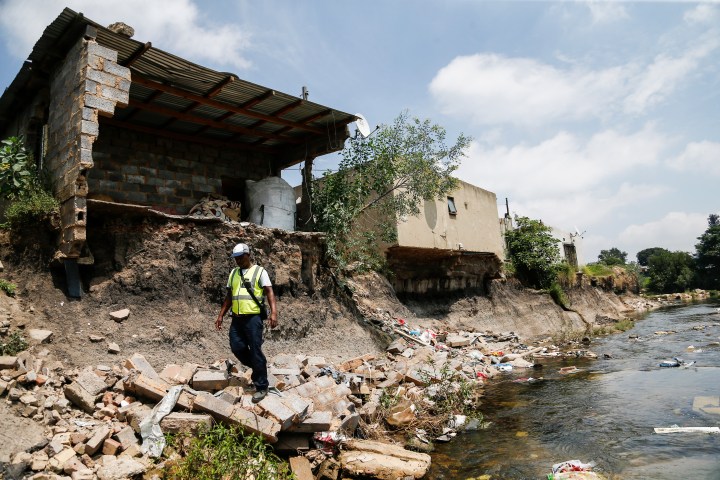
Poor water infrastructure, shacks built along the banks and neglected wetlands all contribute to the shocking state of Johannesburg’s rivers.
‘The water is pitch black, smelly and foamy, with totally unacceptable levels of pollution. People have failed in terms of looking after the infrastructure,” said Andrew Barker, chairman of the Klipriviersberg Sustainability Association (KlipSA).
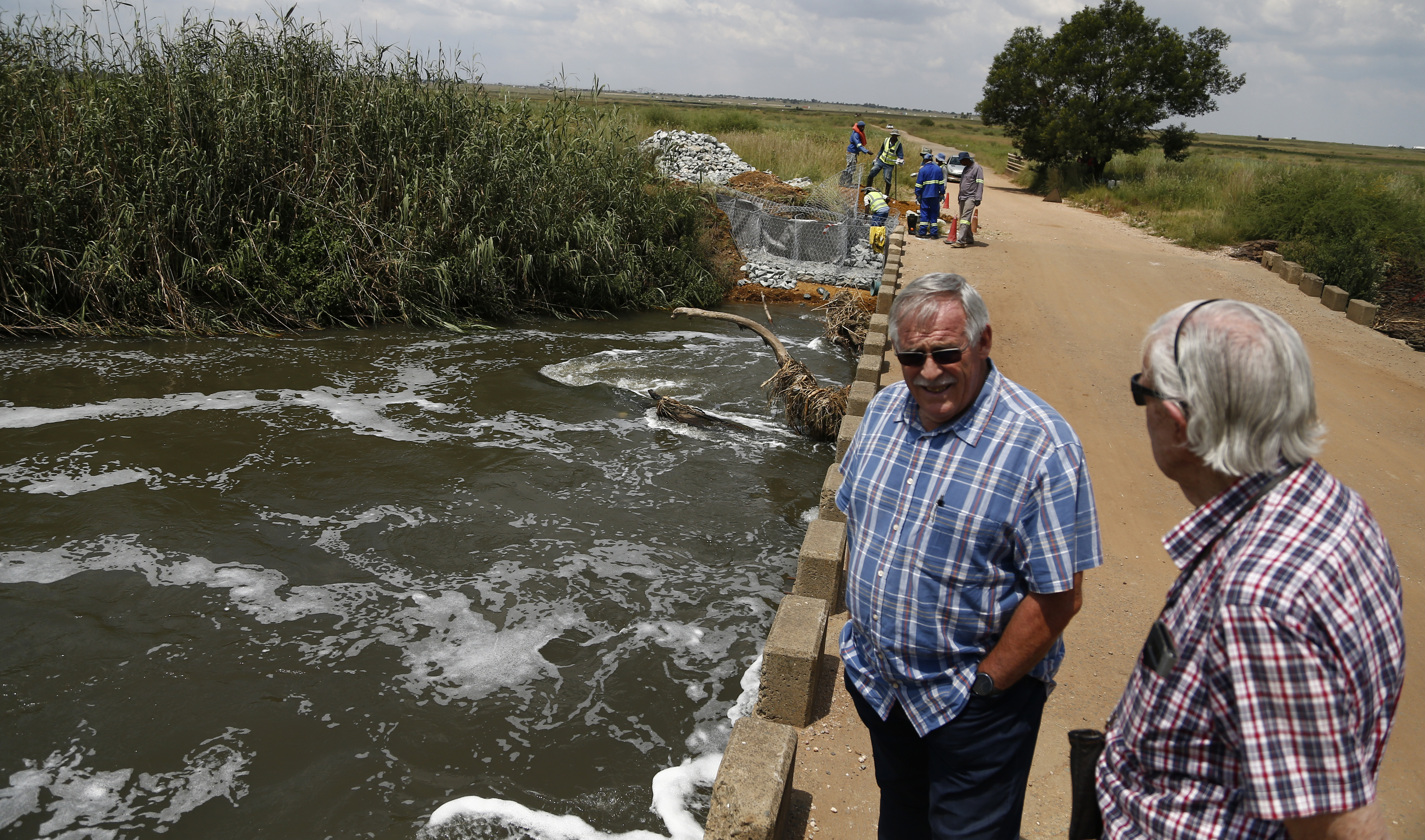
Dennis Jane, a representative from the Klipriviersberg Sustainability Association (KlipSA) (right) with Andrew Barker, founder and chairman of KlipSA (left). (Photo: Felix Dlangamandla / Daily Maverick)
Barker’s description of the Klip River sums up the state of many of the rivers flowing through Johannesburg.
Some of the issues affecting rivers such as the Klip, Jukskei and Braamfontein Spruit include sewage spills from failing wastewater treatment works, the dumping of waste into rivers and uncontrolled development on wetlands that are meant to naturally purify the rivers.
Dr Ferrial Adam, executive manager of nonprofit WaterCAN, told Daily Maverick, “I don’t think we do well in protecting wetlands in South Africa… the wetland really should be treasured and protected. We are dumping on wetlands and we have developments on them.
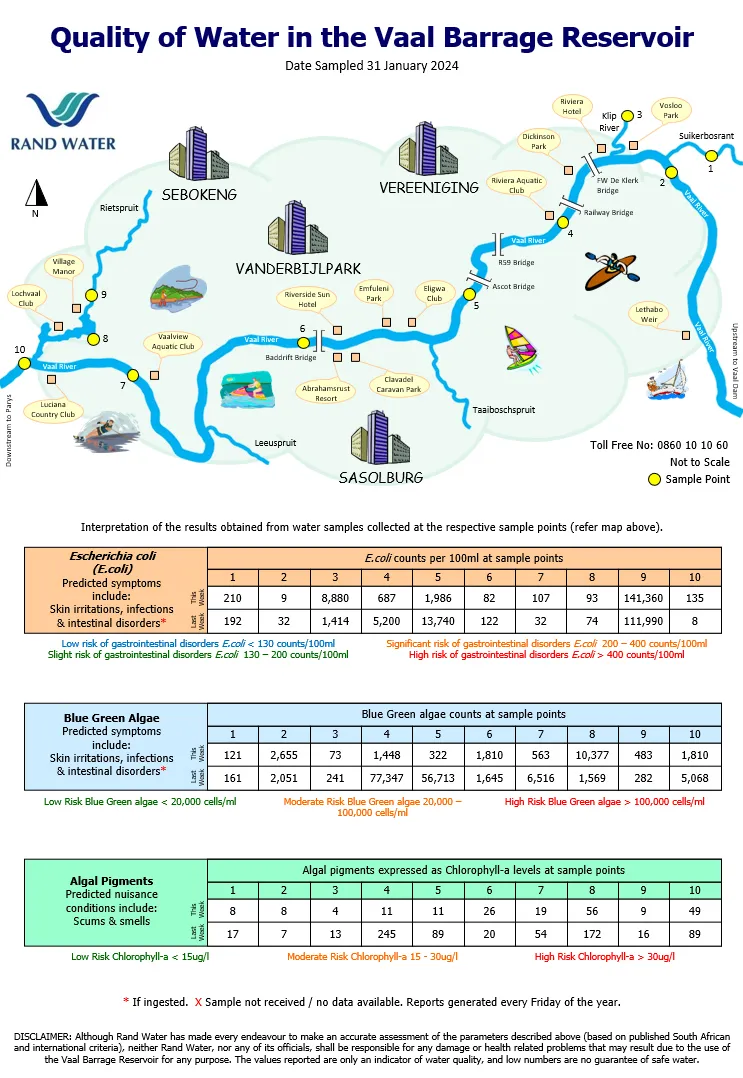 “With the heavy rains that we are seeing with climate change, where you’re having rain dumps – those areas [where there is development] flood. This then impacts the socioeconomic issues in those areas. We’re saying, don’t build on wetlands.
“With the heavy rains that we are seeing with climate change, where you’re having rain dumps – those areas [where there is development] flood. This then impacts the socioeconomic issues in those areas. We’re saying, don’t build on wetlands.
“People are using wetlands as a dumping ground – from construction material to waste to heavy metal pollution. They think the waste won’t flow into the river. Added to that is the sewage – Goudkoppies and Bushkoppies [waste water treatment works] are completely damaging.”
Daily Maverick previously reported that WaterCAN had laid criminal charges against the city for not addressing issues at the two wastewater treatment facilities. The organisation particularly flagged how load shedding had negatively impacted the Goudkoppies facility, and that sewage was being pumped into Bushkoppies – a facility that lacked the capacity to process additional waste, resulting in sewage spills.
Read more in Daily Maverick: Citizen network initiative opens criminal case against City of Johannesburg after yearlong sewage spill
Nombuso Shabalala, spokesperson for Johannesburg Water, told Daily Maverick that the entity geared its efforts towards “abating potential risks” that impacted on the environment.
Shabalala did not provide the requested detailed breakdown of how these efforts were carried out, but emphasised that the protection of water resources was managed by the Department of Water and Sanitation.
Without sharing the requested results, she said of water testing efforts: “There are specific sampling points meant to test the quality of final effluent released into the water resource or river system.
“However, the exercise is limited because it does not consider downstream river activities which affect water quality. Johannesburg Water is not responsible for activities taking place downstream these points (beyond the testing points) unless there is a direct spillage which needs to be addressed or attended to.”
A recurring pattern
Daily Maverick visited Klip River, Jukskei and Braamfontein Spruit and witnessed a recurring pattern: the smell of sewage, foamy water and pollution along the banks and in the rivers.
Of the rivers, the Klip River seemed to be in the worst shape. There is also sewage flowing into the murky, frothy water, some of it coming from the malfunctioning Goudkoppies and overburdened Bushkoppies facilities.
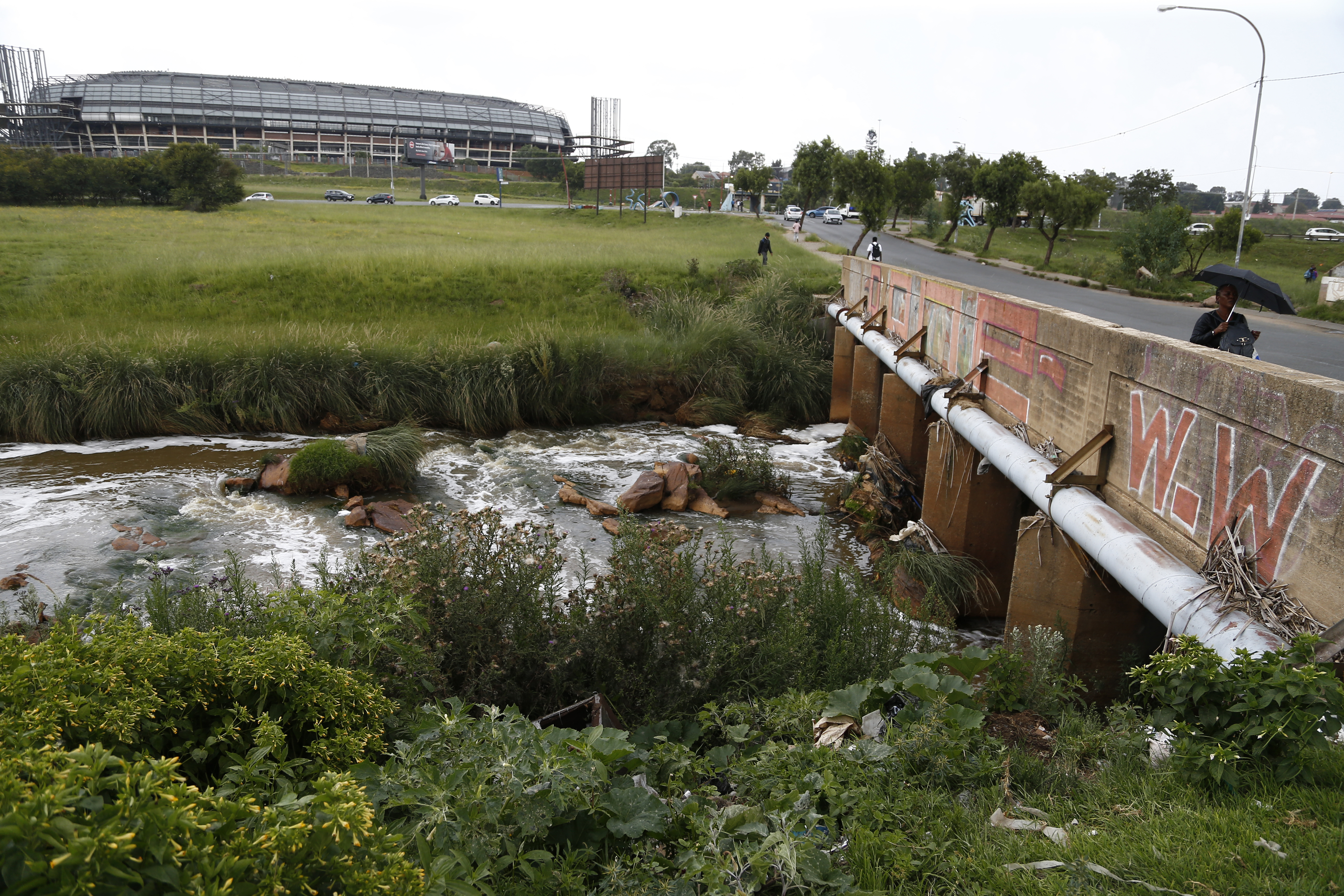
The Klip River, rife with sewage and pollution, flows beneath the Orlando Stadium in Soweto. (Photo: Felix Dlangamandla / Daily Maverick)
“We’ve got all these wastewater treatment works along this valley, and all of them are overwhelmed. They’re not coping,” said Barker.
Another contributor to the pollution comes from surrounding mines, with a study showing that waste from gold mines is considered to be the largest single source of pollution in South Africa, contributing immensely to acid mine drainage.
As Daily Maverick drove past sections of the river south of Johannesburg, we saw several mine dumps in proximity to the river and its streams. This reporter was also overwhelmed by a choking sewage stench along the route following the river – which included a few pump stations. We also observed building material waste that had been dumped on open land and in wetlands.
Nature-based solutions such as the revitalisation of wetlands are among KlipSA’s key focuses. However, with developments having expanded into these natural habitats, this has become a challenge for the organisation to take on alone.
Wasting wetlands
City of Johannesburg environment and infrastructure services MMC Jack Sekwaila told Daily Maverick that the city was aware of property development near and in wetlands in the south of Johannesburg, as well as of “encroachments at various scales along certain river banks”.
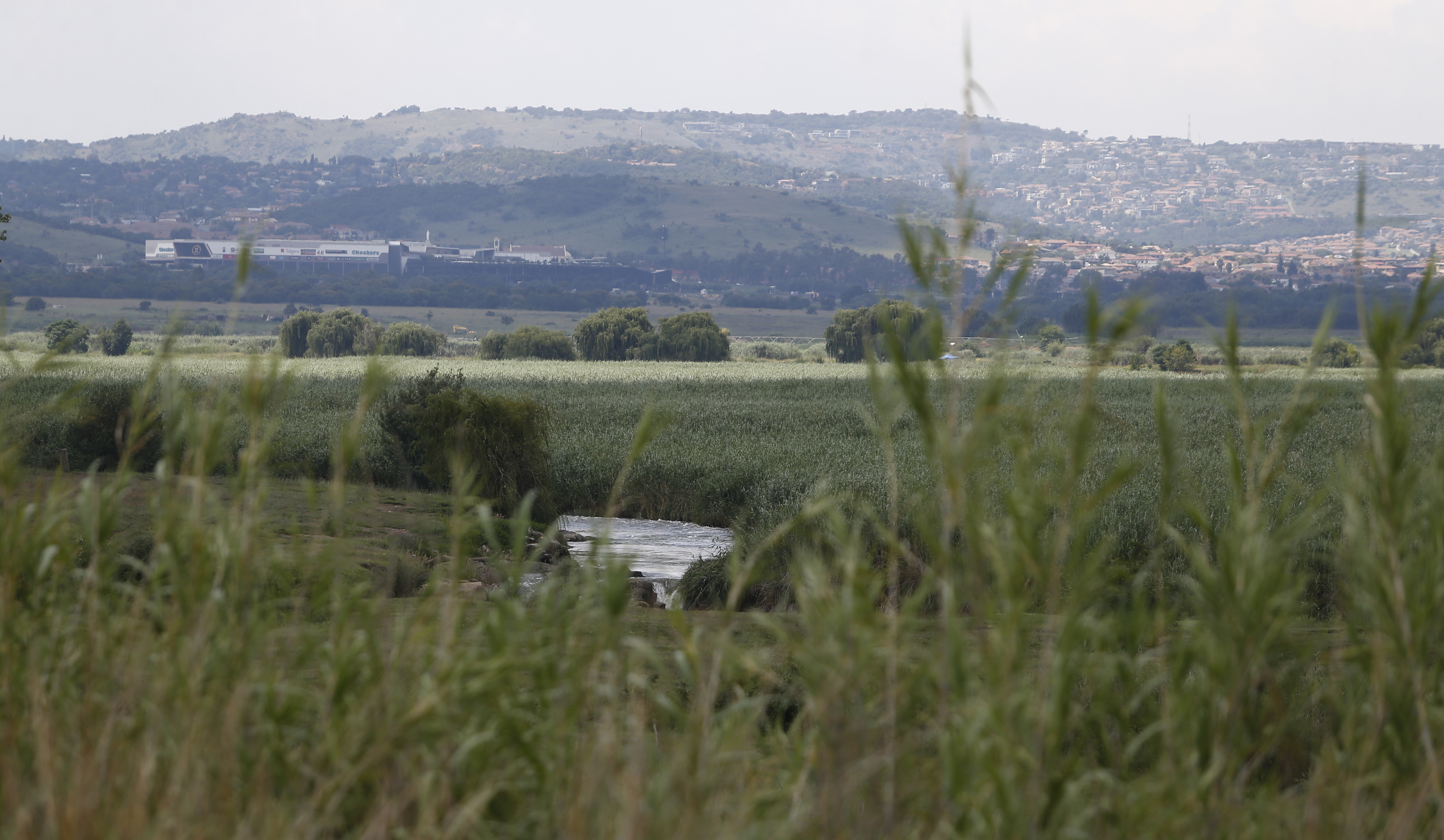
Alberton, in the south of Johannesburg, is in an area encompassing many wetlands on which development has taken place. (Photo: Felix Dlangamandla / Daily Maverick)
Sekwaila said some of these developments took place before there was legislation prohibiting such activities, particularly the National Environmental Management Act and the Water and Biodiversity Acts.
“Throughout the city, there are several wetlands and wetland habitats of considerable ecological value, and developments in environmentally sensitive areas – specifically watercourses and wetlands – often result in open space areas being unable to reduce the flow of surface water, filter pollutants and absorb or store water to reduce the stress on the drainage systems, which may contribute to increased risks of flooding in the city,” said Sekwaila.
He said the city conducted “blitz operations” to educate civil society about water pollution and management and other environmental issues. In addition, the city had a three-year contract with the Johannesburg City Parks and Zoo to clean up the Bruma Catchment alongside controlling alien invasive species.
‘Our oldest resource’
Paul Maluleke, founder of the Alex Water Warriors, says the city’s efforts for a cleaner environment and waterways have not been extended to the work he and his staff and 1,500 volunteers do along the Alexandra section of the Jukskei River.
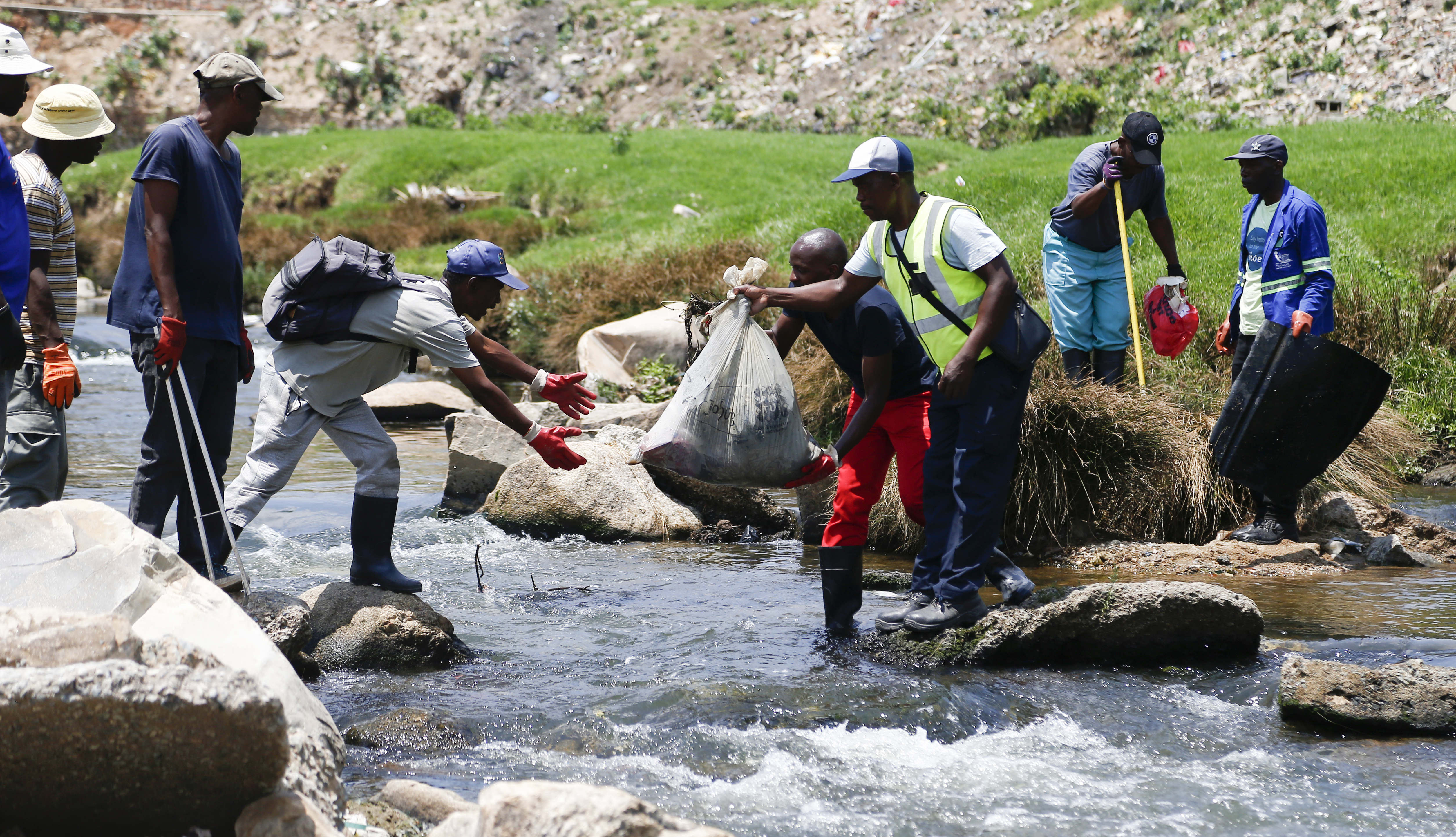
Alex Water Warriors (workers and volunteer groups) collect about 500 tones of waste in a day. (Photo: Felix Dlangamandla / Daily Maverick)
“This is a heritage site,” Maluleke told Daily Maverick, pointing to the Jukskei River. “Water is our oldest resource.”
Alex Water Warriors began as a volunteer programme to keep the river clean, but soon turned into an employment opportunity for township youth.
Maluleke is now expanding the organisation to include ecotourism opportunities, as efforts to restore the natural habit have created the potential for activities such as birdwatching.
“Right now the river is eroding… they need to come and install gabions. It’s been years and we’re not sure what’s happening with that. If they could give us the authority to carry out some of the work, we would bring in the private sector for support.”
Gabions – large wire mesh structures containing rocks – are usually placed along river banks to slow erosion, limit deposits into the river and protect spawning habitats.
“The Jukskei River flows throughout the year. When it rains, the water levels rise. There are parts of the river where there are gabions, but there are other parts that are ignored by the government.
“Their role is to release the budget and install the gabions. Our organisation does not have the capacity to carry out that kind of work. Government must come on board.
“They know about these issues – we have engaged with them; local councillors, the City of Johannesburg, Department of Water and Sanitation, Gauteng province. They all know our story very well, so we are not sure what is holding them back. This is the biggest challenge we have,” said Maluleke.
Living on the edge
Daily Maverick visited Alexandra and saw homes balanced precariously on the Jukskei River’s banks that have been eroded in floods over the years.
Gabions were promised to slow the erosion, but never materialised.
Residents along this strip, which accommodated more than 10 shacks, were either not home or unwilling to talk about the situation due to being fed up with years of inaction. There is a sense of hopelessness.
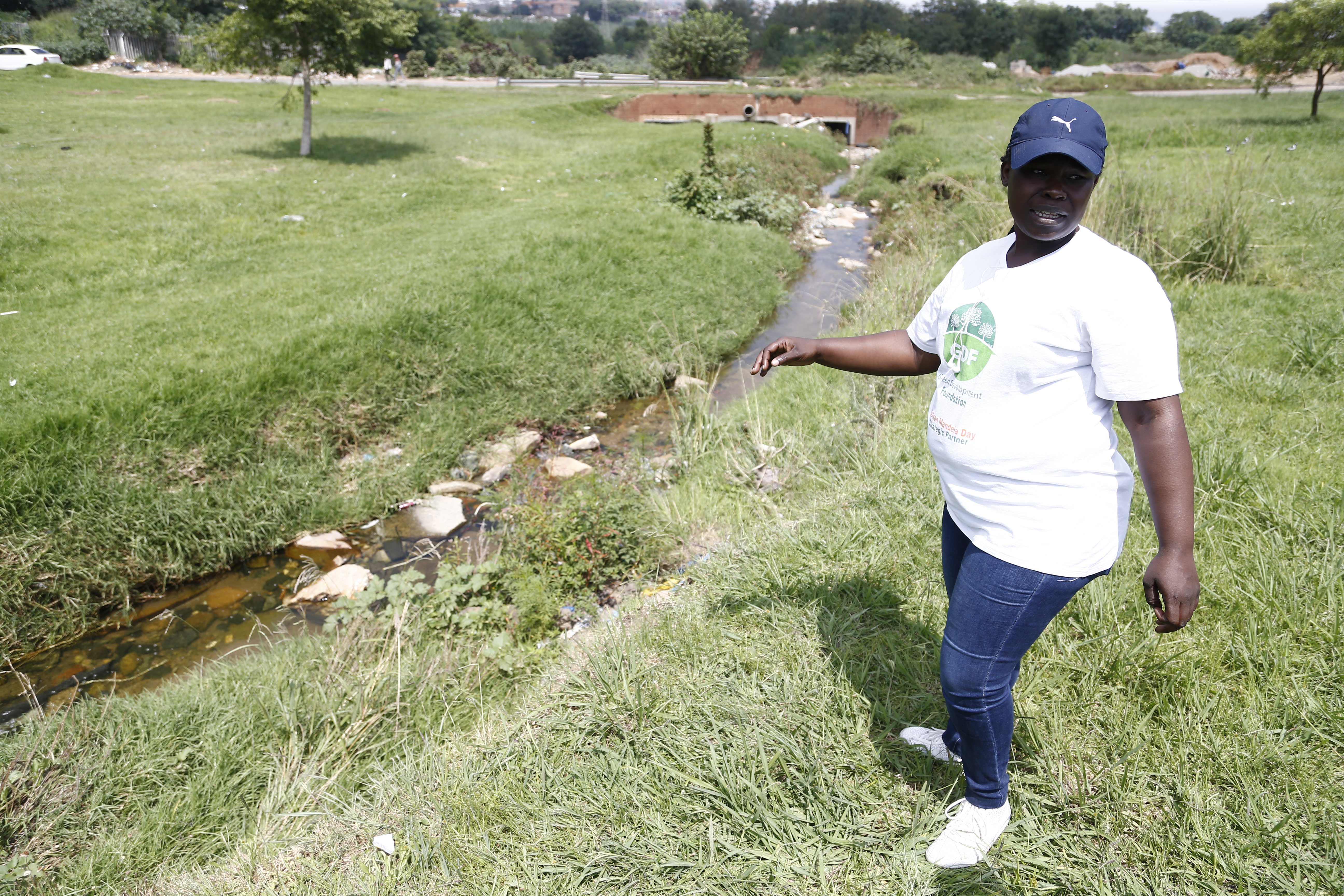
An Alex Water Warriors volunteer speaks about pollution such as E.coli running into a stream. (Photo: Felix Dlangamandla / Daily Maverick)
“The human settlements department is currently engaged in a formalisation process aimed at addressing and, where necessary, relocating communities residing along rivers that are susceptible to flood risks and may contribute to pollution along these waterways,” said Sekwaila.
“As part of this endeavour, the department is undertaking a structured approach to formalise existing informal settlements and, where feasible, relocate them to safer areas less prone to flooding.
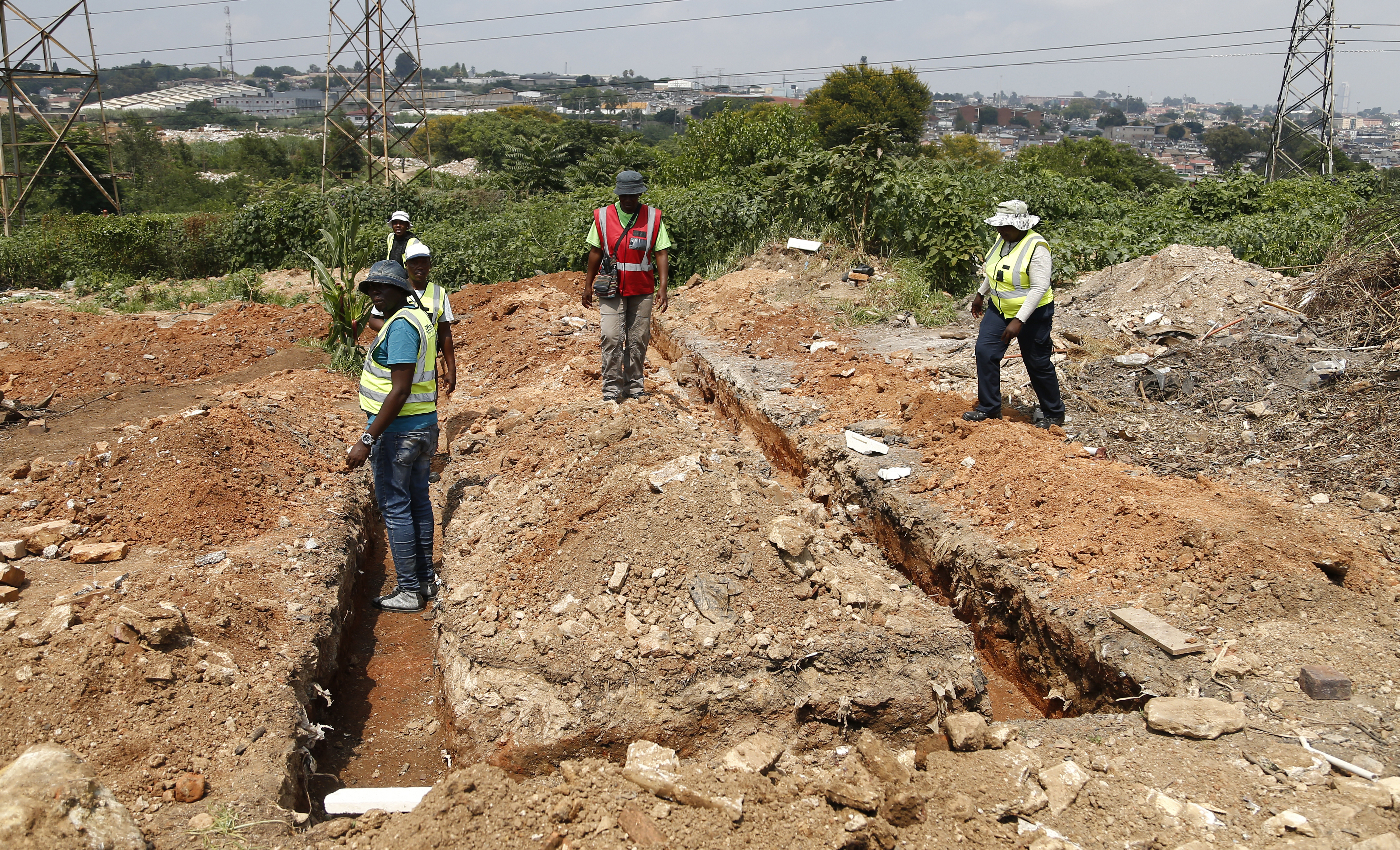
Alex Water warriors are breaking new ground, partnering with private companies to build a new recycling and e-waste station in the township. (Photo: Felix Dlangamandla / Daily Maverick)
“Through this process, the aim is to reduce the vulnerability of communities to flood-related hazards while also minimising the detrimental effects of human settlements on water quality along the riverbanks.”
Cleanup efforts
Residents of Paulshof in northern Johannesburg, operating under the SpruitSpritz group, have been conducting cleanup efforts along the last stretch of the Braamfontein Spruit. They have seen the effects of communities living along the river banks.
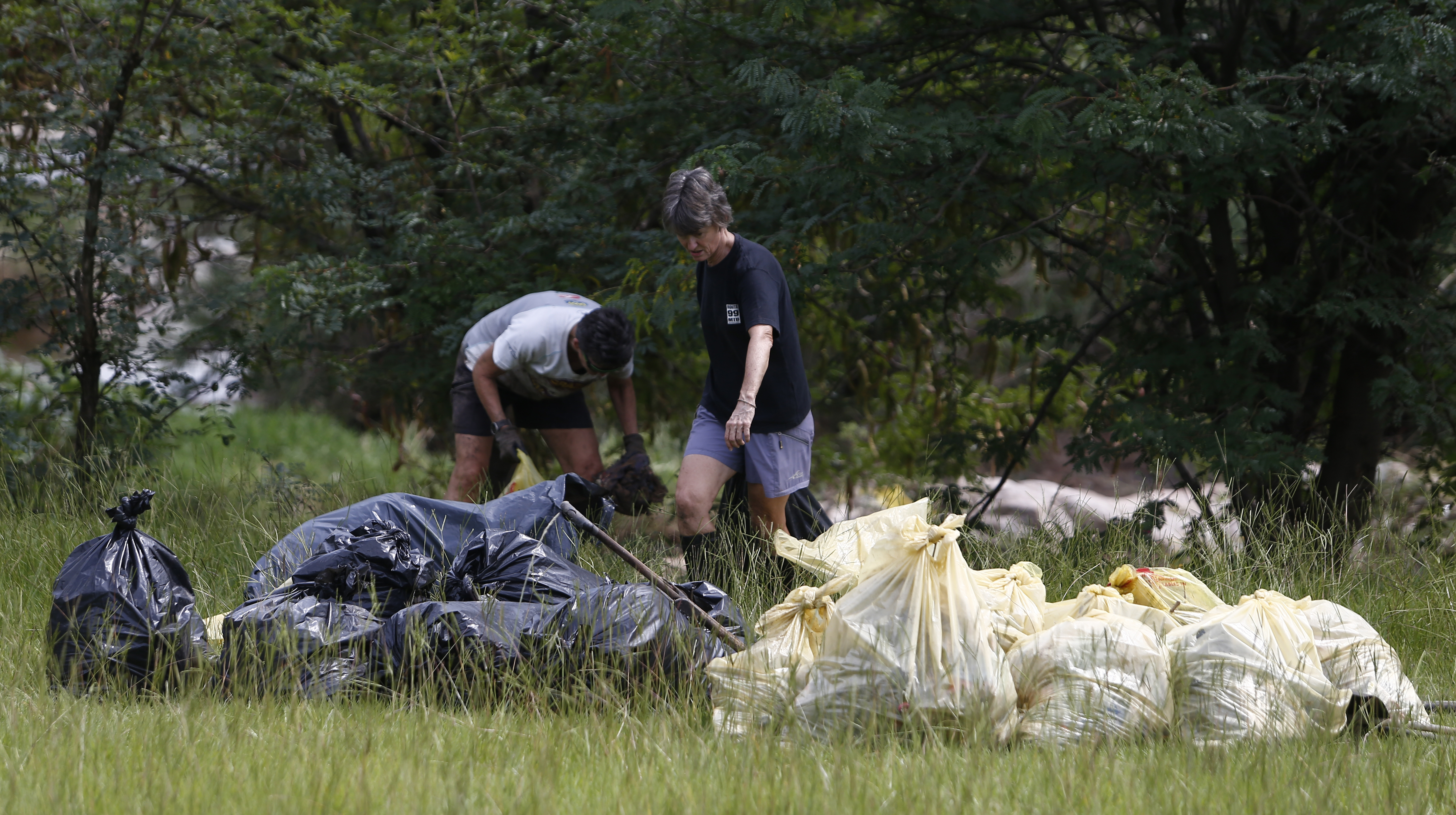
Refuse bags filled with waste are collected after the Braamfontein River clean-up effort. (Photo: Felix Dlangamandla / Daily Maverick)
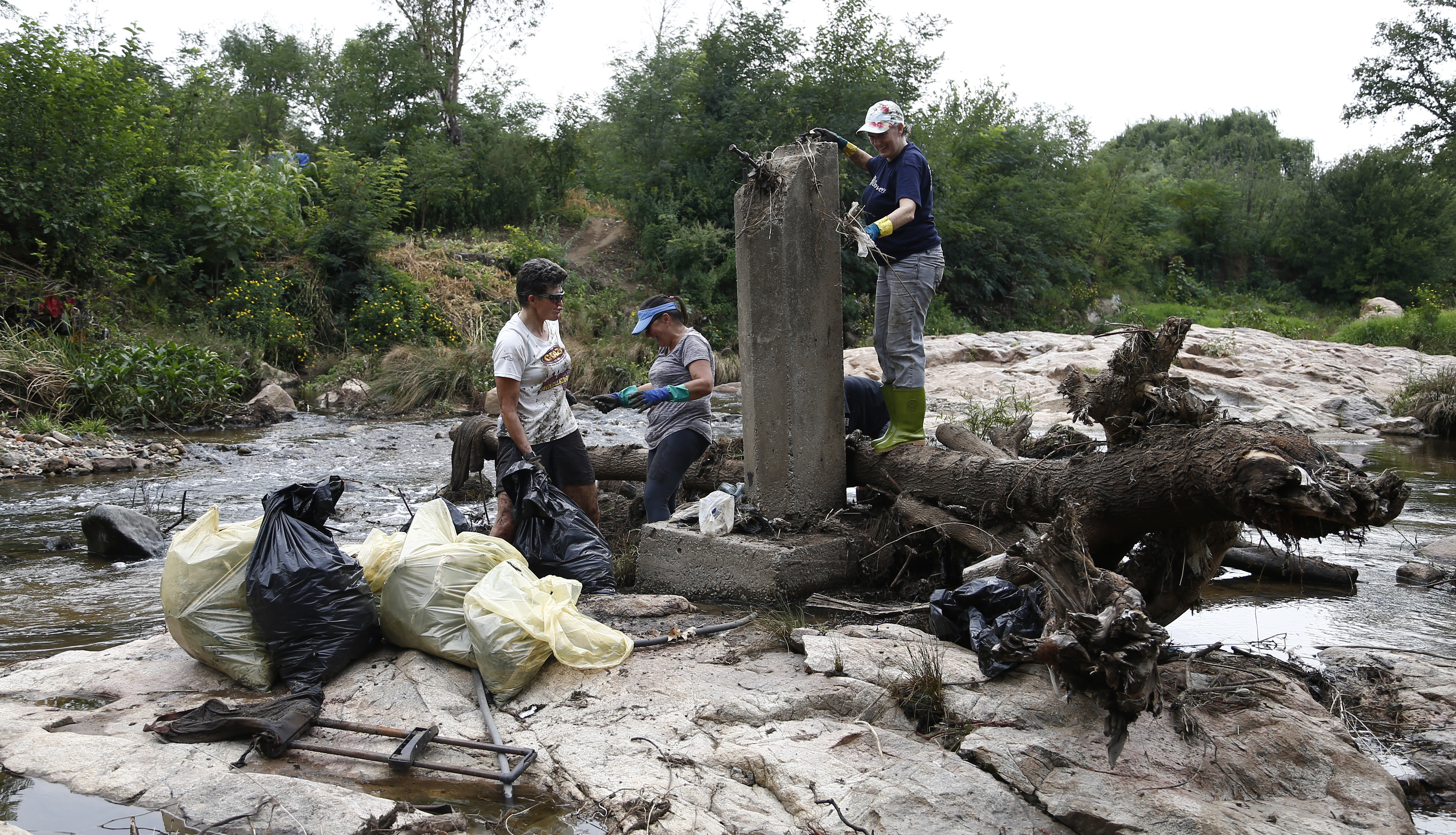
Items such as clothing are found at the confluence of the Braamfontein and Sandpruit rivers in Joburg. Some items come from those living along the banks of the rivers upstream. (Photo: Felix Dlangamandla / Daily Maverick)
Chantal Nativel, who helps coordinate efforts for SpruitSpritz, told Daily Maverick that the group had removed about 3,000 bags of trash over the past three years. Much of the garbage came from communities living upstream.
“There’s a lot of dumping from people themselves, but also some companies that collect refuse simply discard it instead of taking it to the dump. We also get a lot of builders dumping, so we’ve had tiles and glass…
“We also get dead chickens that have been sacrificed. A lot of materials that are used in rituals accumulate and get tangled up. We get discarded clothing and even mattresses, and of course plastic. So much plastic. I never realised until I started doing this work that sweet wrappers were such a problem,” said Nativel.
Tests have shown that the water is clear and does not have a particular smell. However, it is considered unsafe to drink due to the presence of faecal matter and fertilisers. The tests indicated high levels of E. coli and coliform from human and animal waste.
“[The pollution at Braamfontein spruit] is not unique to the river. There are the same issues as Hennops, Jukskei, Klein Jukskei and Kliprivier – this is becoming the norm with our rivers. It’s so ugly… completely sickening,” said WaterCAN’s Adam.
“A lot of our foundation as a society is based on having clean drinking water – as a human right. The state of our rivers and streams and our wastewater treatment plants – this is an emergency. Water cuts against sectors; you need it for health, education, economics, for living. We cannot allow it to get any worse.” DM






















 Become an Insider
Become an Insider
I drive over and along the Jukskei often. Everywhere the fruits of “freedom” can be seen. The river, the banks, in the trees are never ending signs of “freedom”. The population can do whatever they want when and where ever they want. Truck loads of plastic, paper and of course, sewerage can be seen everywhere. Nobody bothers to dump their rubbish in a bin or on a heap. When your packet of chips is empty, you drop it where you are. If you change your baby’s nappy, you leave it where you changed.
A very serious and intense educational effort is required to change the ways of African residents.